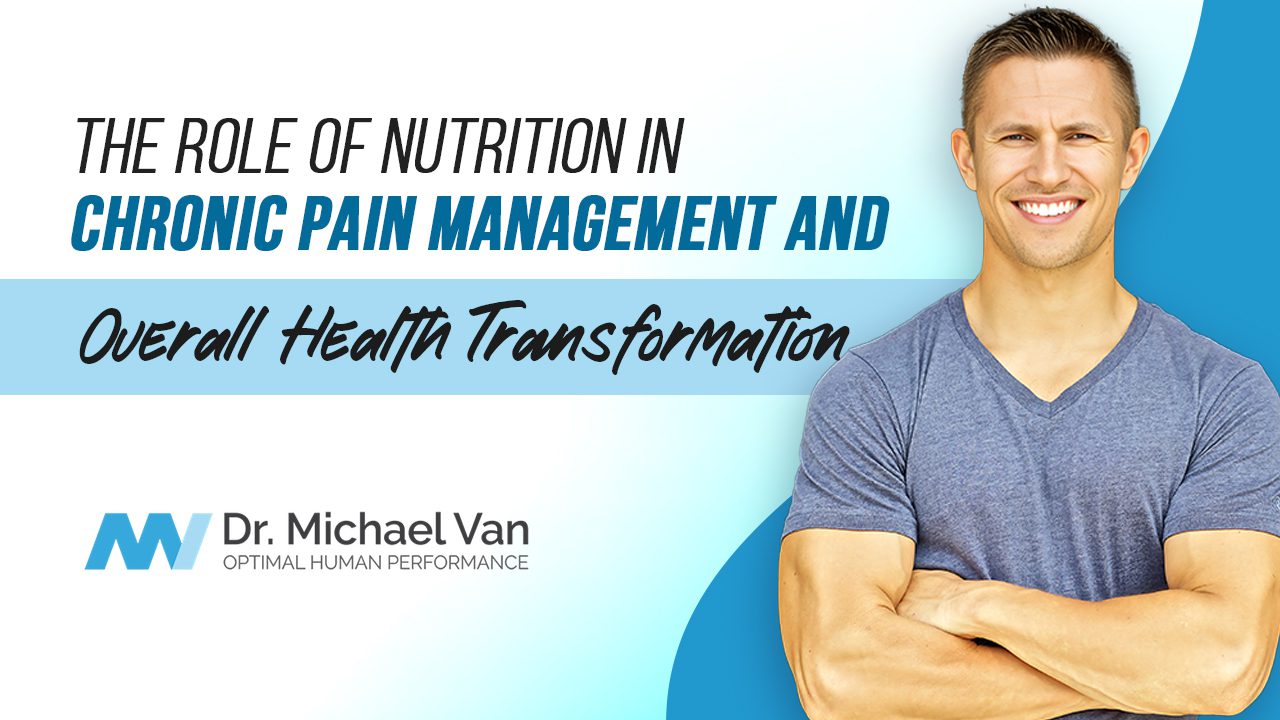The Role of Nutrition in Chronic Pain Management and Overall Health Transformation

Persistent pain can be a constant struggle for individuals dealing with various health concerns. While many treatments focus on medications or interventions, adopting a holistic approach that includes lifestyle modifications, such as improving one's nutrition, can lead to lasting pain relief and overall health transformation.
A balanced, nutrient-rich diet not only provides the body with essential fuel for optimal functioning but also plays a crucial role in the prevention and management of inflammation—an underlying factor in many chronic pain conditions.
Dr. Michael Van, an advocate for holistic health solutions, is committed to educating patients on the importance of nutrition in managing chronic pain and supporting overall well-being. By examining the connection between diet and pain relief, individuals can gain a better understanding of how to create a personalized, nutrient-rich dietary plan to support their health transformation journey.
In this blog series on www.drmichaelvan.com, we will explore the impact of nutrition on chronic pain management and overall health, covering topics such as:
- The link between inflammation and chronic pain, and the role of nutrition in reducing inflammation
- How certain foods can contribute to or alleviate pain, including a deeper look into trigger and anti-inflammatory foods
- Nutritional supplements and their potential benefits for pain management and overall well-being
- Tips for creating and maintaining a healthy, pain-reducing diet plan for long-term success
- Evaluating the effectiveness of popular dietary plans, such as the Mediterranean diet, for chronic pain management
By incorporating evidence-based nutritional strategies, individuals can take control of their pain and improve their health, vastly reducing their reliance on medications or interventions. Under Dr. Michael Van's expertise and guidance, those experiencing chronic pain can explore the benefits of a nutrition-focused approach, paving the way to a holistic, comprehensive health transformation.
Stay tuned to our blog for invaluable insights into the transformative power of proper nutrition and follow Dr. Van's continued support on the journey toward a pain-free, healthy life.
Inflammation and Chronic Pain: The Nutritional Connection
Chronic pain and inflammation often go hand in hand, with many painful conditions such as arthritis, fibromyalgia, and migraines being linked to high levels of inflammation in the body. Inflammation is a natural immune response to injury or infection, but when it becomes chronic, it can cause damage and pain in affected tissues.
One way to manage chronic inflammation and pain is through proper nutrition. Certain foods and nutrients have anti-inflammatory properties that can help alleviate pain by reducing inflammation levels in the body. Conversely, specific dietary elements can trigger inflammation and exacerbate pain.
By understanding the connection between inflammation, chronic pain, and nutrition, it becomes possible to create a dietary plan that supports pain relief and overall health.

Subscribe To Dr Mike's MVP Newsletter!
Exclusive content, interesting topics, real insights.

Subscribe To Dr Mike's MVP Newsletter!
Exclusive content, interesting topics, real insights.
Trigger and Anti-Inflammatory Foods: Knowing What to Eat and Avoid
To create a diet plan that supports pain relief and overall well-being, it is crucial to identify foods that can contribute to inflammation and those that have anti-inflammatory properties. Here is a list of some common trigger and anti-inflammatory foods:
Trigger Foods:
- Refined carbohydrates: Foods such as white bread, white rice, and pastries can contribute to inflammation.
- Fried and processed foods: Consuming excessive amounts of fried and processed foods can increase inflammation in the body.
- Sugary drinks and snacks: High sugar intake has been linked to increased inflammation and pain.
- Saturated and trans fats: Found in some meats, dairy, and processed foods, these fats can exacerbate inflammation.
- Alcohol: Excessive alcohol consumption may contribute to inflammation and worsening of pain symptoms.
Anti-Inflammatory Foods:
- Fruits and vegetables: Foods rich in antioxidants and fiber, such as berries, spinach, and kale, can help reduce inflammation.
- Whole grains: Replacing refined carbohydrates with whole grains such as brown rice, quinoa, and whole wheat bread can support a healthier inflammatory response.
- Healthy fats: Incorporating healthy fats, like those found in avocados, olive oil, and nuts, can help alleviate inflammation.
- Lean proteins: Sources of lean protein like chicken, fish, and beans can contribute to reduced inflammation and pain relief.
- Spices and herbs: Certain herbs and spices, such as turmeric and ginger, have natural anti-inflammatory properties that can benefit individuals dealing with chronic pain.
Nutritional Supplements and Their Benefits for Pain Management
In addition to consuming a balanced diet, nutritional supplements can also play a role in managing chronic pain and supporting overall health. Some key supplements to consider include:
- Omega-3 fatty acids: Found in fish oil and flaxseed oil, omega-3s have powerful anti-inflammatory properties and can support brain and heart health.
- Vitamin D: Many individuals with chronic pain have low levels of vitamin D, which is essential for bone health and immune function. Supplementing with vitamin D can help alleviate pain and improve overall well-being.
- Magnesium: This essential mineral can help reduce muscle pain and cramping and support healthy nerve function.
- Glucosamine and Chondroitin: These joint health supplements can provide relief for those dealing with arthritis and other joint-related pain conditions.
Tips for Creating a Healthy, Pain-Reducing Diet for Long-Term Success
Adopting a healthier diet for chronic pain management may seem daunting initially, but these tips can support long-term success:
- Make Gradual Changes: Instead of overhauling your entire diet at once, start by incorporating more anti-inflammatory foods and gradually reducing your intake of trigger foods.
- Plan and Prep Meals: Having nutritious meals and snacks prepared in advance can make sticking to a healthier diet easier and more convenient.
- Experiment with New Recipes: Trying new, healthy recipes can help keep your diet plan exciting and prevent boredom or frustration.
- Stay Hydrated: Drinking plenty of water can help reduce inflammation and ensure optimal functioning of the body's systems.
- Monitor Progress and Adjust as Needed: Regularly assess how your dietary changes are affecting your pain levels and overall health, and make adjustments as needed for continued improvement.
Popular Dietary Plans for Chronic Pain Management
There are several popular diets that emphasize anti-inflammatory foods and may help with chronic pain management, such as:
- The Mediterranean Diet: This diet focuses on fruits, vegetables, whole grains, legumes, lean proteins, and healthy fats, and has been linked to reduced inflammation and numerous health benefits.
- The DASH Diet: Designed to lower blood pressure, this diet also emphasizes anti-inflammatory foods and may support pain relief.
- The Anti-Inflammatory Diet: This diet specifically targets inflammation and pain reduction by emphasizing plant-based foods and healthy fats.
Conclusion
Nutrition plays a significant role in managing chronic pain and promoting overall health transformation. By adopting a balanced, nutrient-rich diet plan that targets inflammation and supports healing, individuals can experience lasting pain relief and improved well-being.
Dr. Michael Van's holistic approach to health education and guidance empowers patients to take control of their pain and transform their lives through the power of proper nutrition. Stay informed on the latest in nutrition and pain management by following our blog and benefiting from Dr. Van's expertise in the field.
Transform your health and manage chronic pain with the power of nutrition! Our chiropractor experts in Huntington Beach offer personalized nutrition plans to help you achieve your health goals and live your best life.
Whether you're dealing with chronic pain or just looking to improve your overall health, our team can help. By focusing on whole foods and natural supplements, we can help you optimize your nutrition and achieve the results you're looking for.
Don't wait any longer to start your health transformation - contact us today to schedule your appointment and take the first step towards a healthier, happier you!
Dr. Michael Vanderschelden, DC
18600 Main St STE 110
Huntington Beach, CA 92648
Copyright ©2025
Site designed by iTech Valet
Subscribe To Dr Mike's MVP Newsletter. Exclusive Content ONLY!
Dr. Michael Vanderschelden, DC
18600 Main St STE 110
Huntington Beach, CA 92648
Copyright ©2025
Site designed by iTech Valet
*These statements have not been evaluated by the Food and Drug Administration. These products are not intended to diagnose, treat, cure or prevent any disease.
